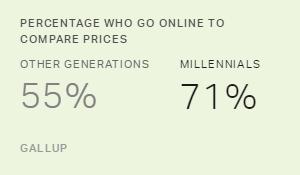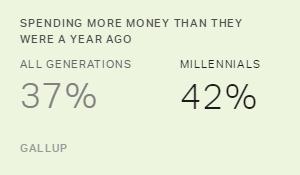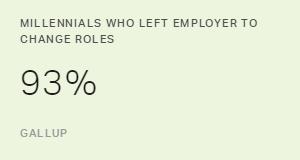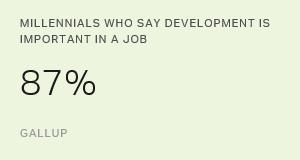Story Highlights
- Millennials have money to cover their needs, not their wants
- 50% of millennials would switch jobs for a raise of 20% or less
- Engaged millennials are less likely to leave over money
Millennials have a complicated relationship with money. They're financially optimistic, yet they feel economically restrained. Compensation matters a lot to millennials -- but their jobs are about a lot more than their paychecks.
When it comes to the economy and money, millennials are a rather hopeful group. Gallup's latest report, How Millennials Want to Work and Live, found that more than half of millennials (51%) believe the U.S. economy is "getting better," compared with 44% of Gen Xers, 37% of baby boomers and 31% of traditionalists. Millennials -- born between 1980 and 1996 -- are also more likely to view current economic conditions as "excellent" or "good."
They also show greater confidence in their financial standing. Fifty-six percent of millennials say they are feeling better about their financial situation these days -- a higher percentage than Gallup found in any other generation.
Despite their enthusiasm, millennials' purchasing power is hindered by a few economic realities. A majority of millennials (69%) say they have enough money to buy the things they need. However, only 28% of millennials say they have more than enough money to do what they want, and 38% say they have enough money right now to make a major purchase, such as a car, appliance or furniture, or to cover a household repair. Thus, it appears that millennials are financially stable enough to cover the necessities, but not much more, and they lack savings or a "cushion" for big-ticket items or emergencies.
Millennials also have the highest rates of underemployment and the lowest earnings in the U.S. compared with all other generations. Though millennials' lower earnings could relate to age and relative newness to the workforce, wage growth in the U.S. has been rather anemic since the Great Recession, meaning many millennials started their careers in tight spots financially and have not been able to make up much ground. Add to that high levels of student debt and it becomes clear why millennials have little in the way of discretionary income or savings.
Income Matters, but Development Matters More
Gallup has found that 48% of millennials say that overall compensation is extremely important to them when seeking new job opportunities. One in two millennials also says they would consider taking a job with a different company for a raise of 20% or less.
Millennials are often saddled with the "job-hopper" label, and it appears to be largely well-earned. Given their financial constraints, millennials' job-switching tendencies do make some sense; they might continually chase jobs that lead them to bigger paychecks.
But when considering which jobs to apply for, millennials actually place other attributes ahead of income. These traits include:
- opportunities to learn and grow
- quality of manager
- quality of management
- interest in type of work
- opportunities for advancement
Like all employees, millennials care about their income. But for this generation, a job is about more than a paycheck -- it's about a purpose. Despite the financial constraints many millennials are experiencing, they still place jobs that allow them to grow, develop and do what they do best over jobs that supplement their income.
Engagement Deters Job-Hopping
For leaders and managers, the key to attracting and retaining millennials is to know how much money matters to them, as well as to understand what matters most to their engagement. Gallup research reveals that millennials who are engaged at work are 26% less likely than millennials who aren't engaged to say they would consider taking a job with a different company for a raise of 20% or less.
Download How Millennials Want to Work and Live to learn more about what millennials want from a job, manager and organization.



